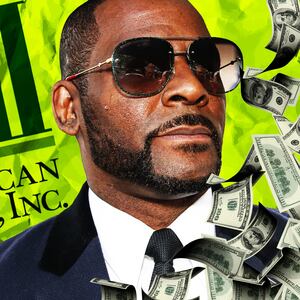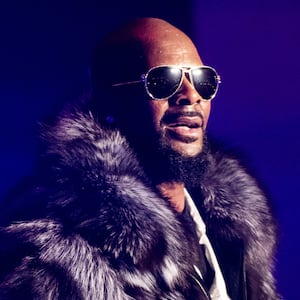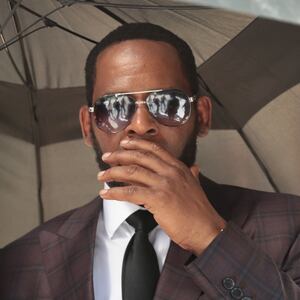R. Kelly accusers slammed the National Enquirer tabloid empire on Tuesday for a secret plan to funnel money to the alleged rapist and pedophile for his cooperation in a documentary series.
“They’re willing to give this man all of this money despite all of the lives he has damaged, while the women he has hurt have to pick up the pieces, rebuild their lives, and are struggling to pay their bills,” Kitti Jones, a former Dallas radio DJ who gave up her career to be with Kelly, told The Daily Beast.
“It’s screwed up.”
The Daily Beast reported Monday that Dylan Howard, a former editor of the National Enquirer who is now a senior vice president for parent company American Media Inc., proposed an elaborate scheme to use a shell company and licensing agreements to pay Kelly, who was sitting in jail charged with sex crimes.
According to documents and audio recordings, the money would have been compensation for the disgraced R&B singer’s cooperation in a televised documentary series Howard was hoping to produce through the paper’s parent company.
“No network is going to buy or pay Mr. Kelly. They simply won’t do that. They are not going to take the public relations hit associated with doing business with him,” Howard explained to Kelly’s representative, Don Russell, in a phone call authenticated by an expert for The Daily Beast.
To cover their tracks, Howard said, the media giant would pay Kelly from “a production company through a shell company through whatever company is designated on your end for the licensing of locations, licensing of music, and other things we can creatively come up with.”
Howard’s offer made earlier this year came against the backdrop of allegations from young, mostly black women alleging Kelly physically, mentally, and sexually abused them for nearly two decades.
The evidence includes a video that allegedly shows Kelly having sex with the 13-year-old niece of R&B singer and Kelly protege Sparkle—who also blasted American Media for its documentary plan.
“It’s disheartening that an executive and media company would be willing to go through such lengths, as music companies previously have, in efforts of supporting Robert and having an opportunity to capitalize despite being faced with horrific and criminal allegations,” said Sparkle, whose real name is Stephanie Edwards.
“However not surprised!”
Kelly was indicted in 2002 on child pornography charges stemming from the video purportedly of Sparkle’s niece. After less than a day of deliberation, a jury acquitted him on all counts.
Sparkle, who released the duet “Be Careful” with Kelly in 1998, says she was one of the first people to speak out against the “I Believe I Can Fly” hitmaker, and she later joined several alleged victims in Lifetime’s six-hour docuseries, Surviving R. Kelly.
That documentary focused new attention on Kelly’s behavior and months later, he was indicted in state court in Illinois—a prelude to federal charges that were leveled in two states over the summer.
He has denied the charges, and his attorney told The Daily Beast he did not know about any docu series or payment plan.
In a statement, Howard described his discussions with Russell as exploratory and said if the deal had gone forward, he would not have hidden the details from whatever network bought the project.
However, on the recorded phone call, Howard told Russell that to get the series picked up it would have to be falsely labeled as production independent of Kelly.
“Obviously, we would be embedded with you so it’s not as if it really is independent, but it has to be sold to the market as independent,” he said.
“How do you profit?” Howard continued.
“I license music from you. I license locations from you such as homes, et cetera. And that is how you get profit participation in such a production, because no network is even going to allow a production company’s books to show on their books, that there is a money trail going to you.”
Another Kelly accuser, 41-year-old Lizzette Martinez, told The Daily Beast that although “it’s not a shock, it’s disappointing to hear” about Howard’s proposal after “the women from the original documentary are still dealing with the emotional and financial backlash.”
Martinez, who also appeared in the Lifetime series, first met Kelly in 1995 at a Florida shopping mall. At the time, she was a 17-year-old high school senior and the singer was 28. She said Kelly took her virginity soon after, hit her several times, and told her to get an abortion after she came pregnant with his child.
“We shared our stories not for monetary gain, but to bring awareness to an epidemic of men in Hollywood and other high positions in the world abusing their power. I have a serious problem with giving him a platform to do more harm,” Martinez said.
In the Lifetime series, Jones said she first met Kelly in June 2011, when her Dallas radio station organized an after-party for one of his concerts. Two weeks after moving into his Chicago home, Jones said, Kelly sought to control everything about her life—from her choice of clothes to when she was allowed to use the bathroom.
Jones—who says she was beaten, starved, and forced to have sex with other women while living at Kelly’s Chicago compound during their two-year relationship—added the most “disheartening” thing about AMI’s proposal is that it wouldn’t have occurred without the women coming forward.
“They wouldn't even be approaching this guy if it wasn’t for me and other accusers being brave enough to tell our story,” she said.
“We could still be suffering in silence but we decided to tell our story,” Jones said. “But to find out a bigwig of a huge tabloid is treating him like he is the star of the show still—it’s heartbreaking.”









